
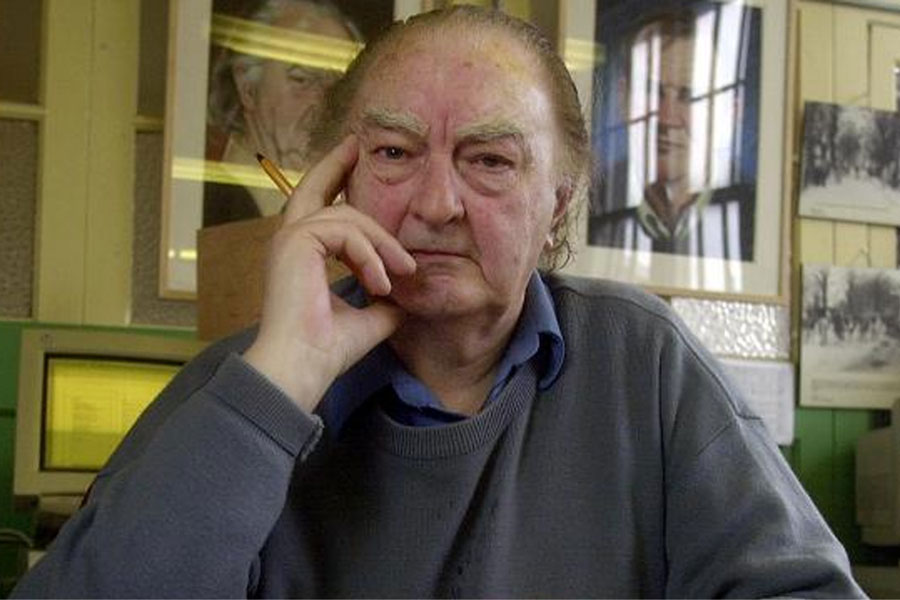
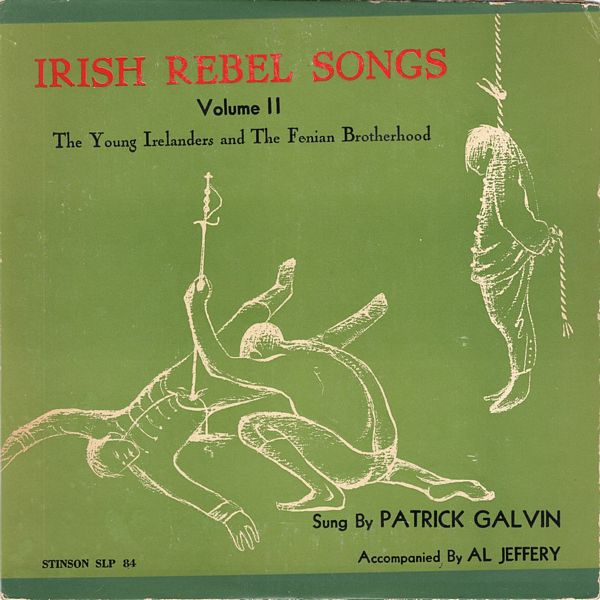 |
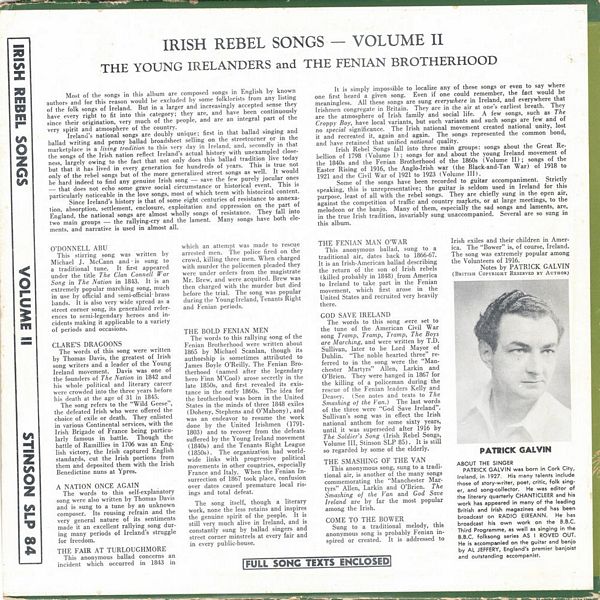
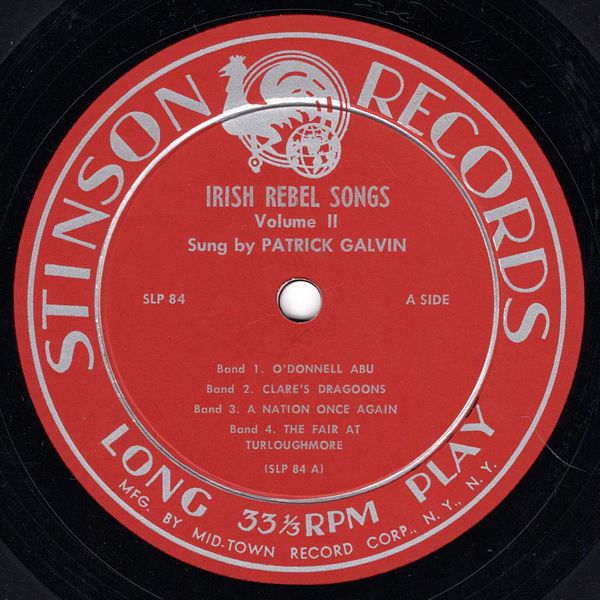
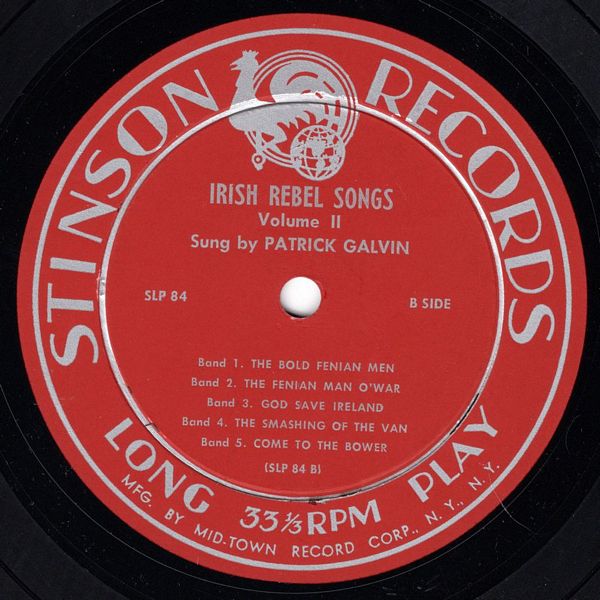 |
Sleeve Notes
Most of the songs in this album are composed songs in English by known authors and for this reason would be excluded by some folklorists from any listing of the folk songs of Ireland. But in a larger and increasingly accepted sense they have every right to fit into this category; they are, and have been continuously since their origination, very much of the people, and are an integral part of the very spirit and atmosphere of the country.
Ireland's national songs are doubly unique; first in that ballad singing and ballad writing and penny ballad broadsheet selling on the street-corner or in the marketplace is a living tradition to this very day in Ireland, and, secondly in that the songs of the Irish nation reflect Ireland's actual history with unexampled closeness, largely owing to the fact that not only does this ballad tradition live today but that it has lived in every generation for hundreds of years. This is true not only of the rebel songs but of the more generalized street songs as well. It would be hard indeed to find any genuine Irish song — save the few purely jocular ones — that does not echo some grave social circumstance or historical event. This is particularly noticeable in the love songs, most of which teem with historical content.
Since Ireland's history is that of some eight centuries of resistance to annexation, absorption, settlement, enclosure, exploitation and oppression on the part of England, the national songs are almost wholly songs of resistance. They fall into two main groups — the rallying-cry and the lament. Many songs have both elements, and narrative is used in almost all.
It is simply impossible to localize any of these songs or even to say where one first heard a given song. Even if one could remember, the fact would be meaningless. All these songs are sung everywhere in Ireland, and everywhere that Irishmen congregate in Britain. They are in the air at one's earliest breath. They are the atmosphere of Irish family and social life. A few songs, such as The Croppy Boy, have local variants, but such variants and such songs are few and of no special significance. The Irish national movement created national unity, lost it and recreated it, again and again. The songs represented the common bond, and have retained that unified national quality.
Irish Rebel Songs fall into three main groups: songs about the Great Rebellion of 1798 (Volume I) songs for and about the young Ireland movement of the 1840s and the Fenian Brotherhood of the 1860s (Volume II) songs of the Easter Rising of 1916, the Anglo-Irish war (the Black-and-Tan War) of 1918 to 1921 and the Civil War of 1921 to 1923 (Volume III).
Some of the songs have been recorded to guitar accompaniment. Strictly speaking, this is unrepresentative; the guitar is seldom used in Ireland for this purpose, least of all with the rebel songs. They are chiefly sung in the open air, against the competition of traffic and country markets, or at large meetings, to the melodeon or the banjo. Many of them, especially the sad songs and laments, are, in the true Irish tradition, invariably sung unaccompanied. Several are so sung in this album.
O'DONNELL ABU
This stirring song was written by Michael J. McCann and is sung to a traditional tune. It first appeared under the title The Clan Connell War Song in The Nation in 1843. It is an extremely popular marching song, much in use by official and semi-official brass bands. It is also very wide spread as a street corner song, its generalized references to semi-legendary heroes and incidents making it applicable to a variety of periods and occasions.
CLARE'S DRAGOONS
The words of this song were written by Thomas Davis, the greatest of Irish song writers and a leader of the Young Ireland movement. Davis was one of the founders of The Nation in 1842 and his whole political and literary career were crowded into the three years before his death at the age of 31 in 1845.
The song refers to the "Wild Geese", the defeated Irish who were offered the choice of exile or death. They enlisted in various Continental services, with the Irish Brigade of France being particularly famous in battle. Though the battle of Ramillies in 1706 was an English victory, the Irish captured English standards, cut the Irish portions from them and deposited them with the Irish Benedictine nuns at Ypres.
A NATION ONCE AGAIN
The words to this self-explanatory song were also written by Thomas Davis and is sung to a tune by an unknown composer. Its rousing refrain and the very general nature of its sentiments made it an excellent rallying song during many periods of Ireland's struggle for freedom.
THE FAIR AT TURLOUGHMORE
This anonymous ballad concerns an incident which occurred in 1843 in which an attempt was made to rescue arrested men. The police fired on the crowd, killing three men. When charged with murder the policemen pleaded they were under orders from the magistrate Mr. Brew, and were acquitted. Brew was then charged with the murder but died before the trial. The song was popular during the Young Ireland, Tenants Right and Fenian periods.
THE BOLD FENIAN MEN
The words to this rallying song of the Fenian Brotherhood were written about 1865 by Michael Scanlan, though its authorship is sometimes attributed to James Boyle O'Reilly. The Fenian Brotherhood (named after the legendary hero Finn M'Cool) arose secretly in the late 1850s, and first revealed its existence in the early 1860s. The idea for the brotherhood was born in the United States in the minds of three 1848 exiles (Doheny, Stephens and O'Mahony), and was an endeavor to resume the work done by the United Irishmen (1791-1803) and to recover from the defeats suffered by the Young Ireland movement (1840s) and the Tenants Right League (1850s). The organization had worldwide links with progressive political movements in other countries, especially France and Italy. When the Fenian Insurrection of 1867 took place, confusion over dates caused premature local risings and total defeat.
The song itself, though a literary work, none the less retains and inspires the genuine spirit of the people. It is still very much alive in Ireland, and is constantly sung by ballad singers and street corner minstrels at every fair and in every public-house.
THE FENIAN MAN O'WAR
This anonymous ballad, sung to a traditional air, dates back to 1866-67. It is an Irish-American ballad describing the return of the son of Irish rebels (killed probably in 1848) from America to Ireland to take part in the Fenian movement, which first arose in the United States and recruited very heavily there.
GOD SAVE IRELAND
The words to this song were set to the tune of the American Civil War song Tramp, Tramp, Tramp, The Boys are Marching, and were written by T.D. Sullivan, later to be Lord Mayor of Dublin. "The noble hearted three" referred to in the song were the "Manchester Martyrs" Allen, Larkin and O'Brien. They were hanged in 1867 for the killing of a policeman during the rescue of the Fenian leaders Kelly and Deasey. (See notes and texts to The Smashing of the Van.) The last words of the three were "God Save Ireland". Sullivan's song was in effect the Irish national anthem for some sixty years, until it was superseded after 1916 by The Soldier s Song (Irish Rebel Songs, Volume III, Stinson SLP 85). It is still so regarded by some of the elderly.
THE SMASHING OF THE VAN
This anonymous song, sung to a traditional air, is another of the many songs commemorating the "Manchester Martyrs" Allen, Larkin and O'Brien. The Smashing of the Van and God Save Ireland are by far the most popular among the Irish.
COME TO THE BOWER
Sung to a traditional melody, this anonymous song is probably Fenian inspired or created. It is addressed to Irish exiles and their children in America. The "Bower" is, of course, Ireland. The song was extremely popular among the Volunteers of 1916.
Notes by PATRICK GALVIN
(British Copyright Reserved by Author)
ABOUT THE SINGER
PATRICK GALVIN was born in Cork City, Ireland, in 1927, His many talents include those of story-writer, poet, critic, folk singer, and song-collector. He was editor of the literary quarterly CHANTICLEER and his work has appeared in many of the leading British and Irish magazines and has been broadcast on RADIO EIREANN. He has broadcast his own work on the B.B.C. Third Programme, as well as singing in the B.B.C. folksong series AS I ROVED OUT. He is accompanied on the guitar and banjo by AL JEFFERY, England's premier banjoist and outstanding accompanist.